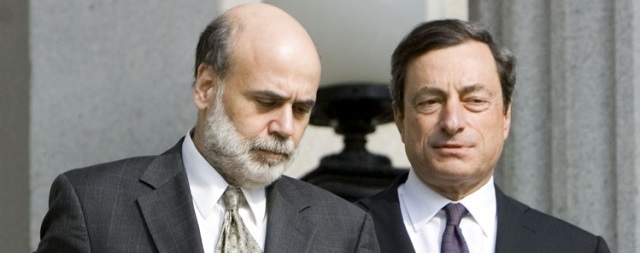The US Federal Reserve‘s announcement–that it will stop buying US bonds at some point–has triggered one of the acutest moments of monetary and finance scarcity. The proof is in that only short-term debt has been left out of the interest rate spike so far, this precisely being the result of investors abandoning long-term bonds.
The Eurozone, always on a precarious balance, has already been hit. Bonds’ falling prices means capital losses for bondholders. That would be banks, whose ability to extract liquidity is now diminished as their collateral assets are reduced, and so short-term loans given in exchange by the European Central Bank will be–adding the haircut of value applied by the ECB. Officially, the main interest rates haven’t moved, but liquidity is now more expensive for our banks, which can only restrict even more their lending activity.
What could the ECB do to counter the Bernanke effect? It could lower interest rates or it could carry out some purchases of bonds, even via special operations as it has done in the past. In any case, the ECB being the central bank of an economic area larger than the US can doubtlessly balance whatever decision the Fed makes.
The Fed wants to stabilise the yield curve because the US economy seems to have found its recovery path. It might have stepped ahead of a real improvement or perhaps governor Bernanke has data we still don’t, but again, the ECB has sufficient powers to intervene.
The question is if ECB’s strong man Mario Draghi actually wants to intervene. Monetary policies are a by-product of politics, after all, and in Europe, politics are tightly controlled from Berlin, which will probably use the Fed’s reaction as example of what the ECB must do. Don’t expect any brave shout out from Draghi right now.
What lies in front of most European economies looks grim: after having gained some leeway to relax austerity measures, debt has become again more expensive for governments and companies. The private sector will suffer more financing difficulties and banking system restructuring processes will need re-evaluation. Public debt levels, meanwhile, will continue growing. Any green shoot will require all of our attention to survive out there.






Be the first to comment on "Is Mario Draghi bothered?"